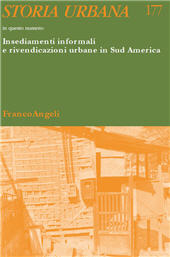"Reorganise the Slum" : Military Intervention in the Favelas After the 1964 Coup in Brazil
119-139 p.
Several authoritarian regimes of the 20th century had in common the implementation of an "authoritarian urban planning" (Haeringer, 2002), while the reorganisation of space was seen as a tool for the transformation of society according to political ideals. The housing conditions of the working classes and the management of slums were often important issues in such planning policies, as we can observe in the case of the Brazilian Military dictatorship (1964-ÂÂ1985). The paper analyses the intervention of the regime towards informal neighbourhoods through the case of Belo Horizonte. The reflection focuses on a military intervention targeting all the favelas of the city and their residents' unions, examined through police investigation reports, press articles and reports of municipal council debates. The analysis leads us to reflect on the modes of political management of urban informality during the Brazilian military regime.
Through our case study, we propose a typology of the different modi operandi adopted by the dictatorship towards favelas, from the strict slum clearance policies to the financial disengagement, through to the "progressive unslumming" trend. Based on the specificity of the urban policies developed in these territories by the regime, the article highlights some aspects that would reinforce the sui generis social-legal condition of the favela in the Brazilian city. [Publisher's text].
Diversi regimi autoritari del XX secolo hanno avuto in comune l'attuazione di una "pianificazione urbana autoritaria", secondo la definizione di Haeringer, mentre la riorganizzazione dello spazio era vista come uno strumento per la trasformazione della società secondo ideali politici. Le condizioni abitative delle classi lavoratrici e la gestione degli insediamenti spontanei costituivano un'istanza prioritaria in queste politiche di pianificazione, come si può osservare nel caso della dittatura militare brasiliana (1964-ÂÂ1985). L'articolo analizza l'intervento del regime nei confronti dei quartieri informali attraverso il caso di Belo Horizonte. La riflessione si concentra sull'intervento militare che investì tutte le favelas della città e le organizzazioni dei loro residenti, analizzato attraverso i rapporti investigativi della polizia, gli articoli di stampa e i resoconti dei dibattiti nel consiglio comunale.
L'analisi porta a riflettere sulle modalità di gestione politica dell'informalità urbana durante il regime militare brasiliano. Attraverso il caso di studio, si propone una tipologia dei diversi modi operandi adottati dalla dittatura nei confronti delle favelas, dalle rigide politiche di sgombero al disimpegno finanziario, passando per la tendenza al desfavelamento progressivo. Sulla base della specificità delle politiche urbane sviluppate in questi territori dal regime, l'articolo porta in primo piano alcuni aspetti che sottolineano la condizione socio/giuridica sui generis delle favelas nella città brasiliana. [Testo dell'editore].
Fait partie de
Storia urbana : rivista di studi sulle trasformazioni della città e del territorio in età moderna : 177, 1, 2024-
Articles du même numéro (disponibles individuellement)
-
Informations
Code DOI : 10.3280/SU2024-177007
ISSN: 1972-5523
DISCIPLINES
KEYWORDS
- Dittatura militare brasiliana, Favelas, Politiche di bonifica delle favelas, Pianificazione urbana, Forze dell'ordine Movimenti sociali
- Brazilian Military Dictatorship, Slums, Slum Clearance Policies, Urban Planning, Law Enforcement, Social Movements


